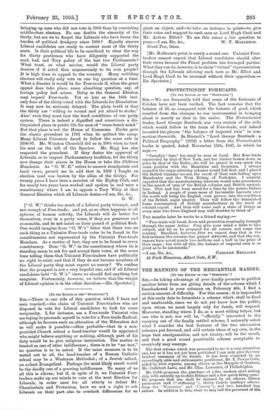SIR,—There is one side of this question which I have
not seen touched,—the claim of Unionist Free-traders who are disposed to vote for Liberal candidates to look for some reciprocity. I, for instance, am a Free-trade Unionist who am trying to persuade myself to vote for a Free-trade Radical, although he favours such an alteration of the Education Act as will make it possible—often probable—that in a non- provided Church school a bead-teacher would be appointed who might believe anything or nothing, although part of his duty would be to give religious instruction. The matter is treated as one of utter indifference ; there is to be "no test," no question is to be asked. If the same measure is to be meted out to all, the head-teacher of a Roman Catholic school may be a Wesleyan Methodist ; of a Jewish school, an ardent Evangelical. Perhaps the most likely result would be the deadly one of a growing indifference. To many of us all this is odious ; but if, in spite of it, we Unionist Free- traders make up our minds to vote at the next Election for Liberals, in order once for all utterly to defeat Mr. Chamberlain and Protection, have we not a right to ask Liberals on their part also to overlook differences for so
great an object, and—to tale an instance in point—to give their votes and support to such men as Lord Hugh Cecil and Mr. Arthur Elliot? To me this seems a fair question to
Great Tew, Oxon.
[Mr. Malleson's point is surely a sound one. Unionist Free- traders cannot expect that Liberal candidates should alter their views because the Fiscal problem has deranged parties. What they can do, however, is to claim " virtual" representation through the Liberals allowing such men as Mr. Elliot and Lord Hugh Cecil to be returned without their opposition.—. ED. Spectator.]






































 Previous page
Previous page